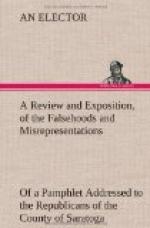Having, as he believed, with some difficulty accomplished his task, he stands to-day amazed at the result. The Irishman has still a grievance—nay more, Ireland talks of “wrongs.” But has she not got him? What more can she want except his purse? And, that too, she is now taking. In the indulgence of an agreeable self-conceit which supplies for him the want of imagination he sees Ireland to-day as a species of “sturdy beggar,” half mendicant, half pickpocket—making off with the proceeds of his hard day’s work. The past slips from him as a dream. Has he not for years now, well, for thirty years certainly, a generation, a life time, done all in his power to meet the demands of this incessant country that more in sorrow than in anger he will grant you, was misgoverned in the past. That was its misfortune, never his fault. This is a steadily recurring phase of the fixed hallucination in his blood. Ireland never is, but only always has been cursed by English rule. He himself, the Englishman of the day, is always a simple, bluff, good-hearted fellow. His father if you like, his grandfather very probably, misgoverned Ireland, but never he himself. Why, just look at him now, his hand never out of his pocket relieving the shrill cries of Irish distress. There she stands, a poverty-stricken virago at his door, shaking her bony fist at him, Celtic porter in her eye, the most fearful apparition in history, his charwoman, shaming him before the neighbours and demanding payment for long past spring cleanings that he, good soul, has forgotten all about or is quite certain were settled at the time. Yes, there she stands, the Irish charwoman, the old broom in her hand and preparing for one last sweep that shall make the house sweet and fit for her own children. And John Bull, honest, sturdy John Bull, believing the house to be his, thinks that the only thing between him and the woman is the matter of wages; that all she wants is an extra shilling. Ireland wants but one thing in the world. She wants her house to herself, and the stranger out of her house.
While he is, in his heart, perfectly aware of this, John Bull (for the reasons given by Richard Cox), is quite determined that nothing shall get him out of the house. “Separation is unthinkable,” say English Ministers. The task of Ireland is to-day what it always has been—to get the stranger out of the house. It is no shame to Ireland or her sons, that up to this they have failed in each attempt. Those attempts are pillars of fire in her history, beacons of light in the desert of sin, where the Irish Israel still wanders in search of the promised land. Few of the peoples in Europe who to-day make up the concert of powers, have, unaided, expelled the invader who held them down, and none has been in the situation of Ireland.




